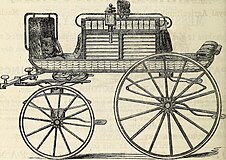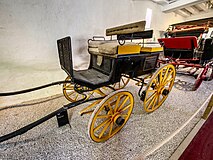Dogcart



A dogcart (also dog-cart or dog cart) is a two-wheeled horse-drawn vehicle pulled by a single horse in shafts, or driven tandem. With seating for four, it was designed for sporting shooters and their gun dogs, with a louvred box under the driver's seat to contain dogs. It was developed in the early 1800s to afford more seating than the gig, which seats only two. Seating is two back-to-back crosswise seats, an arrangement called dos-à-dos from French. There is a hinged tailboard which lowers slightly and, supported by chains, acts as a footrest for the rear-facing passengers. Some dogcarts had a mechanism to slide the entire body forward or rearward along the shafts to help balance the weight for the horse.[1][2]
Other names for specific or regional designs of dogcarts include Battlesden cart, Bent panel cart, Bounder, Country cart, Essex trap, Farmer's dogcart, Going-to-cover cart, High dogcart, Hurdle cart, Leamington cart, Malvern cart, Moray car, Newport Pagnell cart, Norfolk cart, Norfolk shooting cart, Nottingham cart, Oxford bounder, Oxford dogcart, Pony dogcart, Ralli dogcart, Sliding bodied dogcart, Surrey cart, Tandem cart, To-cart, Whitechapel cart, Worcester cart, and Worthing cart.[1]
Dogcart phaeton
A dogcart phaeton is a four-wheeled vehicle pulled by a single horse in shafts, or a pair of horses with a carriage pole. The dogcart phaeton seats four people and is arranged as two back-to-back crosswise seats, called dos-à-dos, with two people facing forward and two others facing the rear. Though the word cart generally means a two-wheeled vehicle, the name dogcart stuck when the body style was mounted on four-wheeled phaeton undercarriages.[1][2]
Other names for specific or regional designs of four-wheel dogcarts include Alexandra dogcart, Continental dogcart, Eridge car, Four-wheeled Ralli car, French Derby cart, Malvern dogcart, Martin's dogcart, and Village phaeton.[1]
-
 Four-wheel dog cart
Four-wheel dog cart -
![Alexandra car, an American version of dogcart phaeton with dos-à-dos seating and a cut under for the forewheels [1]: 1–2](//upload.wikimedia.org/wikipedia/commons/thumb/3/36/Dos-a-Dos_Style_Carriage.jpg/220px-Dos-a-Dos_Style_Carriage.jpg) Alexandra car, an American version of dogcart phaeton with dos-à-dos seating and a cut under for the forewheels [1]: 1–2
Alexandra car, an American version of dogcart phaeton with dos-à-dos seating and a cut under for the forewheels [1]: 1–2 -
 Dogcart phaeton
Dogcart phaeton
In literature
Frequent references to dog-carts are made by Sir Arthur Conan Doyle in his writings about fictional detective Sherlock Holmes,[3] and by many other Victorian writers, as they were a common sight in that era.
See also
- Carriage
- American Electric (1899 automobile), early electric vehicle based on dogcart phaeton structure
- Arrol-Johnston, maker of early automobiles based on the dogcart phaeton structure
References

- ^ a b c d e Smith, D.J.M. (1988). A Dictionary of Horse Drawn Vehicles. p. 66. ISBN 0851314686. OL 11597864M.
- ^ a b Parry, David (1979). English Horse Drawn Vehicles. Frederick Warne & Co. pp. 16, 20, 65. ISBN 0723221723. OL 4485663M.
- ^ Dogcart - Things in "Speckled Band". Melançon Enterprises
- v
- t
- e
carriages and coaches
- Araba
- Bandy
- Barouche
- Berlin
- Brake
- Britzka
- Brougham
- Buckboard
- Buggy
- Calash
- Cariole
- Carryall
- Chaise
- Charabanc ‡
- Clarence
- Coach ‡
- Concord coach ‡
- Coupé
- Diligence ‡
- Dos-à-dos
- Drag
- Droshky
- Fiacre
- Fly
- Four-in-hand
- Hackney carriage ‡
- Hearse
- Herdic
- Horsebus/Omnibus ‡
- Horsecar ‡
- Jingle
- Karozzin
- Kibitka
- Landau
- Mail coach ‡
- Marathon carriage
- Park Drag
- Phaeton
- Post chaise
- Road Coach
- Rockaway
- Runabout (carriage)
- Sociable
- Spider phaeton
- Stagecoach ‡
- Stage wagon ‡
- State Coach
- Surrey
- Tarantass
- Triga
- Victoria
- Vis-à-vis
- Vozok
- Wagonette
carriages and carts
- Cabriolet ‡
- Cape cart
- Cart
- Chariot
- Biga
- Triga
- Quadriga
- Chasse-marée
- Cidomo
- Croydon
- Curricle
- Dogcart
- Dokar
- Ekka
- Float
- Gari
- Gharry ‡
- Gig
- Governess cart
- Hansom cab ‡
- Jaunting car
- Kalesa
- Limbers and caissons
- One-horse shay
- Ralli car
- Red River cart
- Sicilian cart
- Sjees
- Sprung cart
- Stanhope
- Sulky
- Tanga
- Tilbury
- Trap
- Tumbrel
- Two-wheeled calash
- Un-sprung cart
- Volante
- Whiskey
- Sled/sleigh
- Travois
- Troika
- Chuckwagon
- Conestoga wagon
- Covered wagon
- Float
- Lorry
- Telega
- Trolley
- Trolley and lift van
- Vardo
- Wagon
- Coachbuilder
- Front axle assembly
- Hammercloth
- Shaft bow
- Swingletree/singletree
- Undercarriage
- Wainwright
- Wheelwright
- Whippletree/double tree
- Bearing rein
- Blinders
- Breast collar
- Breeching
- Bridle
- Collar
- Crupper
- Horse brass
- Lines
- Saddle
- Terret
- Trace
- Carriages
- Carts
- Coachbuilders
- Carriage museums
- Horse driving
- Images

![Alexandra car, an American version of dogcart phaeton with dos-à-dos seating and a cut under for the forewheels [1]: 1–2](http://upload.wikimedia.org/wikipedia/commons/thumb/3/36/Dos-a-Dos_Style_Carriage.jpg/220px-Dos-a-Dos_Style_Carriage.jpg)











